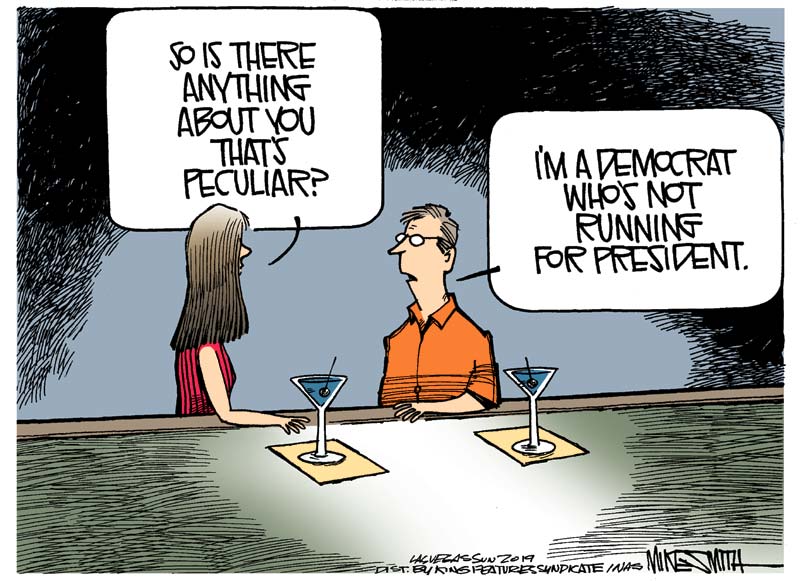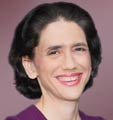
We're about three months from the first Democratic presidential debate, more than 10 months from the Iowa caucuses, and just a smidgen less than a year until Super Tuesday. If, as is expected, both former Vice President Joe Biden and former Rep. Beto O'Rourke, D-Texas, get in the race, virtually all - if not all - the major Democratic contenders will be in the race. So what should we be looking for?
For starters, not all low-performing candidates are the same. Some, including South Bend, Indiana, Mayor Pete Buttigieg and Washington Gov. Jay Inslee, are barely known outside their home states. Others are known but have yet to make any significant impression on voters - such as Sen. Kristen Gillibrand, D-N.Y.
Then there are those going nowhere, such as Rep. Tulsi Gabbard, D-Hawaii, who cannot bring herself to agree with virtually the entire world that Syrian President Bashar Assad is a war criminal for, among other things, bombing civilians, torture and the use of chemical weapons.
The difficulty for the well-known contenders who simply haven't gotten traction is that, even with the debates - which will be crowded, with very limited time for anyone to speak - it's not clear that they have a natural constituency. For the barely known, their challenge will be using media appearances to get to and stay on the debate stage (initially making either the 1 percent or 65,000-donor requirement to qualfiy), and then finding an opening in either Iowa or New Hampshire.
As the threshold for the debates rises, some candidates will drop out altogether. The bottom line: There are about a half-dozen viable candidates at this point, and perhaps two or three others who could make a dash for the upper tier. We should look for the ones with breakout potential.
Second, when O'Rourke enters the race, he'll get gobs of media attention and probably plenty of donations. The challenge for him will be three weeks or a month after he gets in, and whether he's back with the low-single-digit folks or with the bunch near the top. Anticipation is high for the media and his followers; political insiders have good reason to wonder whether O'Rourke is ready, has something to say and truly appreciates the organizational requirements of a presidential race.
Simply declaring that one is going to be an unconventional candidate isn't going to cut it. Without a message, positions and organization, he won't be able to compete with those currently at the top of the heap. The bottom line:Figuring out if O'Rourke is the real deal or a flash in the pan will be a major factor in the setting the contours of the race.
Third, it is debatable whether Sen. Kamala Harris, D-Calif., has picked the correct "lane." Ideologically, she's hugging Sens. Bernie Sanders, I-Vt., and Elizabeth Warren, D-Mass., on the left. If they both falter (and right now, Warren seems to not be catching on), Harris sets herself up as the top progressive to take on Biden. If, however, Sanders has staying power - which is very likely - you have to wonder why she would continue to stake out ground on the left (for example, defending Rep. Ilhan Omar for the Minnesota Democrat's anti-Semitic remarks).
Wouldn't she have more room at the center-left, a compromise between Sanders and Biden (and certainly more electable than Sanders)? We should remember that the candidates are just starting out and that most voters, even regular primary voters, aren't yet watching. That means Harris and others have the chance to shape their message and present concrete proposals that define them well-before the Iowa caucuses. The bottom line: Harris may find a low ceiling if she runs left, meaning her success may depend on refining her message and styling herself as more of a centrist.
Finally, Biden's entry will establish him as the undisputed front-runner, but unlike Hillary Clinton, a front-runner whose nomination is far from certain. With that comes tremendous pressure. What if the former vice president doesn't raise the most money, dominate the debates and soar to the lead in early primary states?
We're going to see just how vulnerable he is, and whether his gravitas, experience and name ID outweigh his well-known deficits - including past statements and votes revolving around race. The bottom line: Biden will either be the Jeb Bush of 2020 (a favorite who crashed and burned), or the 2016 version of Clinton - the dominant figure who marches to an inevitable primary victory.
Sign up for the daily JWR update. It's free. Just click here.
(COMMENT, BELOW)


 Contact The Editor
Contact The Editor
 Articles By This Author
Articles By This Author